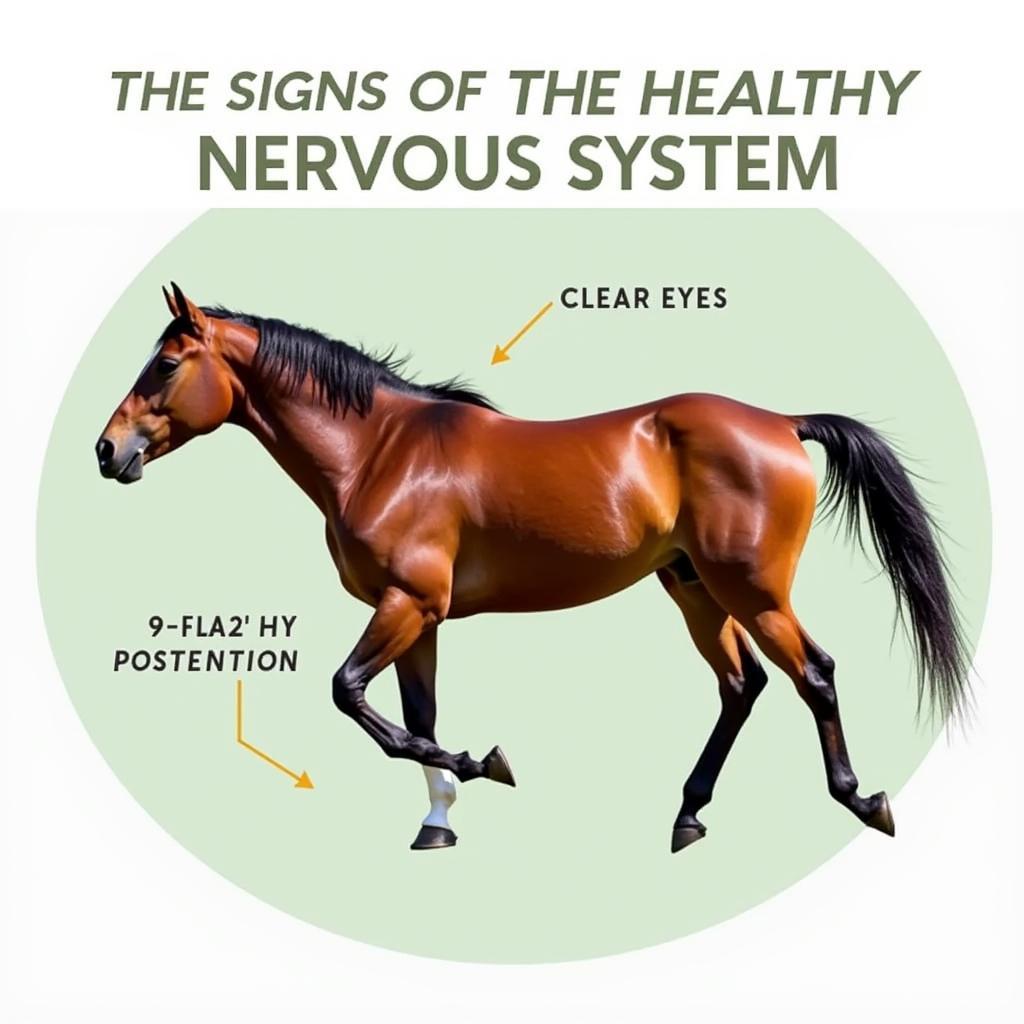The Horse Nervous System is a complex and fascinating network that controls everything from basic bodily functions to complex behaviors. Understanding how this intricate system works is crucial for any horse owner or enthusiast. It plays a vital role in a horse’s overall health, well-being, and performance. By gaining a deeper knowledge of the equine nervous system, you can better understand your horse’s reactions, behaviors, and training responses.
The horse’s nervous system is divided into two main parts: the central nervous system (CNS) and the peripheral nervous system (PNS). The CNS, consisting of the brain and spinal cord, acts as the control center, processing information and sending out instructions. The PNS, a network of nerves branching out from the CNS, transmits these instructions to the rest of the body and relays sensory information back to the CNS. This intricate communication network allows horses to react to their environment, learn new skills, and perform complex movements.
Delving into the Central Nervous System (CNS)
The horse’s brain, similar to humans, is responsible for higher-level functions like learning, memory, and decision-making. It is divided into several regions, each with specific roles, including the cerebrum, cerebellum, and brainstem. The cerebrum controls voluntary movements and processes sensory information. The cerebellum coordinates movement and balance. The brainstem regulates essential functions like breathing and heart rate. This complex interplay allows horses to process information and react accordingly. You can find more information on the overall nervous system in a horse at our dedicated page: nervous system in a horse.
The spinal cord, protected within the vertebral column, serves as the primary communication pathway between the brain and the rest of the body. It relays motor commands from the brain to the muscles and transmits sensory information from the body back to the brain. This vital connection enables the horse to move and respond to stimuli.
Exploring the Peripheral Nervous System (PNS)
The PNS is further subdivided into the somatic nervous system and the autonomic nervous system. The somatic nervous system controls voluntary movements of the skeletal muscles. The autonomic nervous system regulates involuntary functions such as heart rate, digestion, and respiration. This system is crucial for maintaining the horse’s internal balance and responding to changes in the environment.
How Does the Horse Nervous System Impact Behavior?
The horse nervous system plays a significant role in shaping their behavior. Horses are prey animals, and their nervous system is finely tuned to detect and react to potential threats. This heightened sensitivity can sometimes manifest as nervousness or flight responses. Understanding this inherent trait is key to effective training and handling. Sometimes, a calming supplement like Sedivet for horses can be beneficial in stressful situations.
What are the signs of a neurological problem in a horse?
Recognizing neurological issues in horses is essential for prompt treatment. Common signs include: changes in gait or coordination, muscle weakness or atrophy, head tilting, seizures, and behavioral changes. If you observe any of these signs, it’s crucial to consult a veterinarian immediately.
Keeping the Horse Nervous System Healthy
Maintaining a healthy nervous system is vital for your horse’s overall well-being. Providing a balanced diet, regular exercise, and a stress-free environment can help support optimal neurological function. Minimizing exposure to toxins and providing appropriate veterinary care are also essential. Just as you might use Endure horse fly spray to keep pesky insects away and reduce stress, taking proactive steps to maintain your horse’s overall health is equally important.
 Healthy Horse Nervous System
Healthy Horse Nervous System
Dr. Emily Carter, DVM, Equine Specialist, emphasizes, “A healthy nervous system is the cornerstone of a horse’s overall well-being. Proper nutrition, regular exercise, and a calm environment are crucial for maintaining optimal neurological function.”
Dr. David Miller, PhD, Equine Neurobiologist, adds, “Understanding the intricate workings of the horse nervous system is crucial for effective training and management. Recognizing the signs of neurological problems and seeking timely veterinary intervention can significantly impact a horse’s long-term health.”
In conclusion, the horse nervous system is a complex and vital system that dictates every aspect of a horse’s life. Understanding its intricacies is crucial for horse owners and enthusiasts. By prioritizing a healthy lifestyle and recognizing potential neurological issues, you can ensure your horse’s well-being and performance. Remember, a healthy horse nervous system is essential for a happy and thriving equine companion. For more information about supplements that can support your horse’s health, check out our article on magnesium citrate for horses.
FAQ
- What are the main components of the horse nervous system?
- How does the horse’s nervous system affect its behavior?
- What are the common signs of neurological problems in horses?
- How can I maintain my horse’s nervous system health?
- What is the role of the central nervous system in horses?
- How does the peripheral nervous system function in horses?
- What should I do if I suspect my horse has a neurological problem?
You might also be interested in reading our article on Bronco horse fly spray.
Need assistance? Contact us: Phone: 0772127271, Email: [email protected] Or visit us: QGM2+WX2, Vị Trung, Vị Thuỷ, Hậu Giang, Việt Nam. Our customer service team is available 24/7.